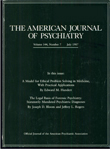Differentiation of depression from chronic pain with the dexamethasone suppression test and DSM-III
Abstract
The concept of chronic pain has become enmeshed with depression. In an attempt to unravel this complex relationship, the authors studied a uniform group of 42 patients with chronic pain, i.e., patients who had chronic low back pain with defined organic pathology, in relation to the dexamethasone suppression test (DST). The results were analyzed in relation to the presence or absence of major depression and cortisol suppression. Forty-one percent of the patients with major depression had abnormal cortisol responses to dexamethasone administration; all patients without major depression had normal responses. These results suggest that chronic pain patients differ from patients with major depression and a positive DST.
Access content
To read the fulltext, please use one of the options below to sign in or purchase access.- Personal login
- Institutional Login
- Sign in via OpenAthens
- Register for access
-
Please login/register if you wish to pair your device and check access availability.
Not a subscriber?
PsychiatryOnline subscription options offer access to the DSM-5 library, books, journals, CME, and patient resources. This all-in-one virtual library provides psychiatrists and mental health professionals with key resources for diagnosis, treatment, research, and professional development.
Need more help? PsychiatryOnline Customer Service may be reached by emailing [email protected] or by calling 800-368-5777 (in the U.S.) or 703-907-7322 (outside the U.S.).



